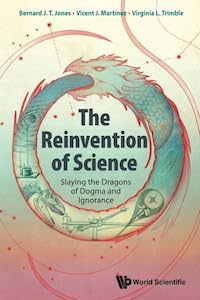"Three noted scientists present a unique view of science history as seen through the lens of its most infamous misconceptions. Well researched and engagingly written, this book demonstrates how the scientific enterprise has evolved and matured over the centuries as clever men and women challenged the common dogmas of their day on how nature works."
—Marcia Bartusiak, Professor of the Practice Emeritus at MIT and the author of seven books on astrophysics and the history of astronomy
"A fascinating tour through the history of science and the sometimes irrational behavior of supposedly rational scientists, by three people who write well and understand what they are writing about."
—Jim Peebles, Emeritus Professor, Princeton University, Nobel Prize in Physics (2019)
"This fascinating and well-written book is hugely informative and wide-ranging, and deserves wide readership."
—Lord Martin Rees, Astronomer Royal, UK
"What happens when three astronomers at the forefront of their field pause to look back at the origins of all they know? The result, The Reinvention of Science, calls to mind the Voyager spacecraft's photo of the Earth as a pale blue dot, taken at a distance of nearly 4 billion miles from the Sun. Here in these pages, the authors lead the reader through the ideas that have brought us from mythology to the brink of dark matter."
—Dava Sobel, author of Longitude, Galileo's Daughter, The Planets and The Glass Universe
"For the practitioner of science and the curious, cultivated reader alike, this book is a gift. It is hugely informative, is fair, and is fun. Its ambition and scope are modulated by a deep sense of humor and penchant for good stories. It is true to is stated mission of showing us how science, with all its limitations has been able to slay the dragons of dogma and ignorance."
—Juan José Gómez Cadenas, Jot Down
"The volume covers a vast territory, not limited to astrophysics and cosmology (in which fields the authors specialize). It is a very well-written and enjoyable read that is strong on accuracy as well as being accessible and pedagogical. I congratulate the authors on a really excellent book."
—Peter Coles, In the Dark, A blog about the Universe, and all that surrounds it
"[A] book to enrich the vision we have of the knowledge of nature and the way in which that knowledge has been produced. ... Most of the chapters deal with Astronomy, Cosmology and Physics, which seems logical given the disciplinary affiliations of the authors. But they also deal with issues from other disciplines ... The authors explain how errors and false beliefs (dragons) have been eliminated from our efforts to understand nature. ... [It is] a magnificent showcase of the way in which the conceptual edifice of science has been constructed. What we do not know — and this is something that the authors themselves point out in the last chapter — is whether it will continue to be done as it has been or whether the irruption of artificial intelligence will radically change the way in which we will acquire new knowledge in the future. ... Read the book and get to the last paragraph. It's worth the effort."
—Juan Ignacio Pérez Iglesias, Mapping Ignorance
|



